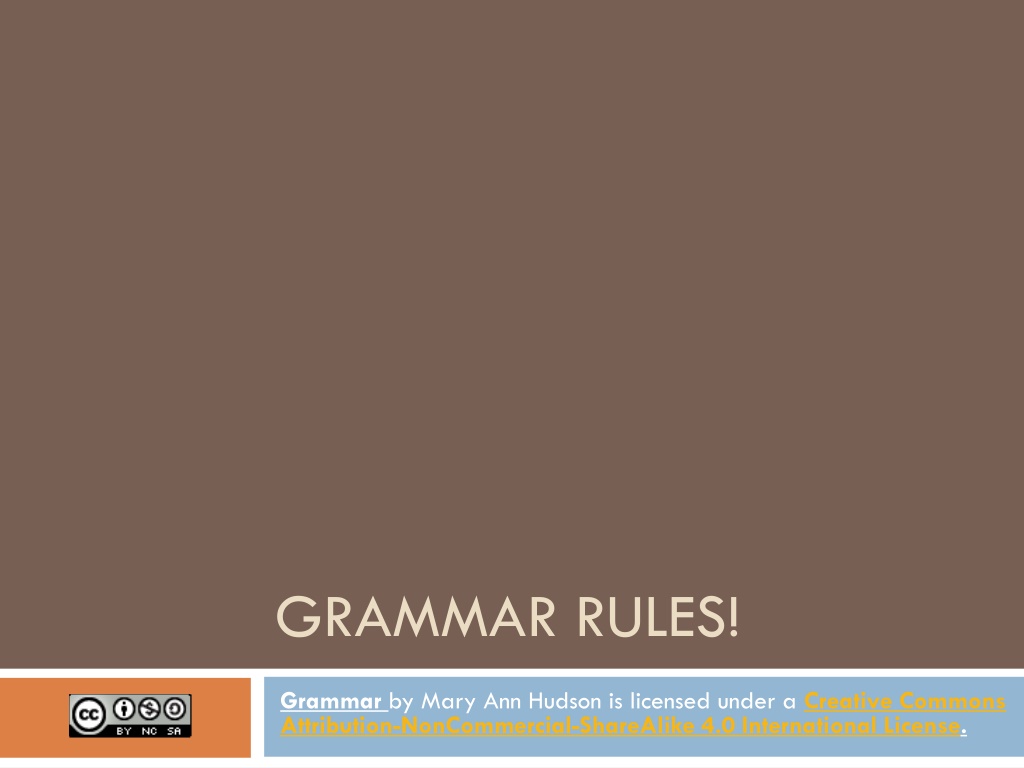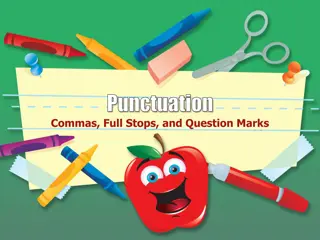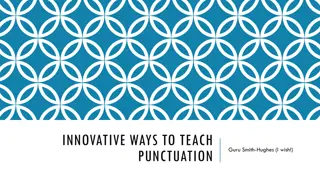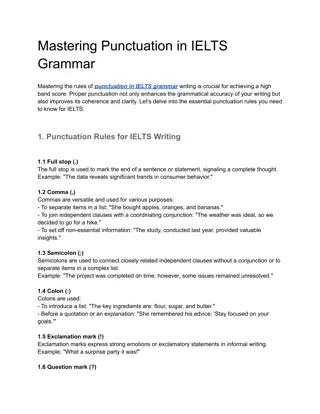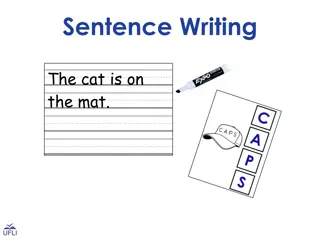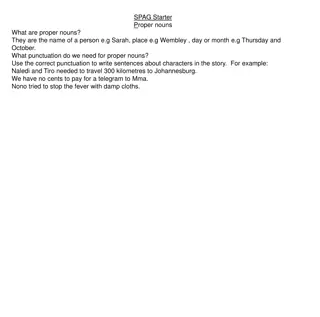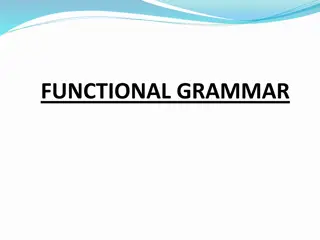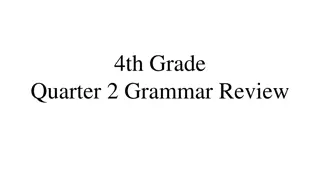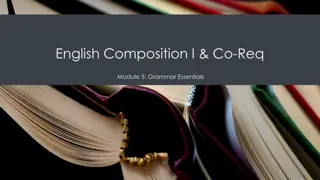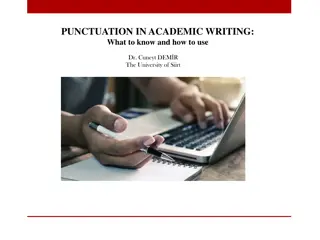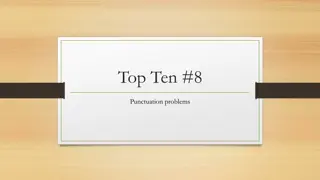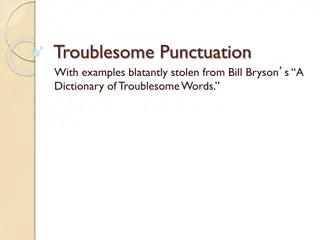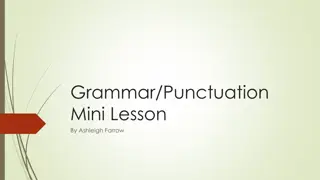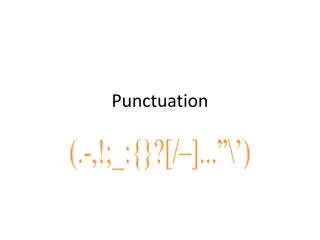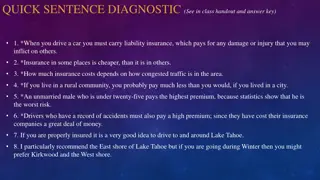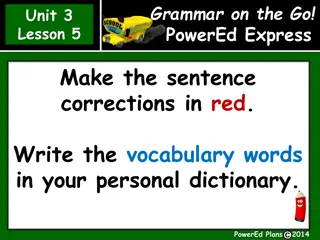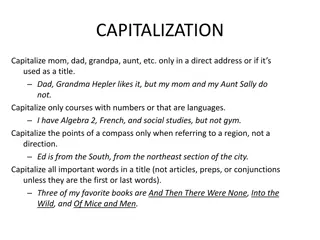Grammar Rules by Mary Ann Hudson - A Guide to Proper Capitalization and Punctuation
Explore essential grammar rules for proper capitalization, including guidelines for proper and common nouns, titles before people's names, quotations, interrupted quotations, titles and subtitles, as well as commonly confused words. Enhance your writing skills by understanding when to capitalize, punctuate, and differentiate between various types of words in your writing.
Download Presentation

Please find below an Image/Link to download the presentation.
The content on the website is provided AS IS for your information and personal use only. It may not be sold, licensed, or shared on other websites without obtaining consent from the author. Download presentation by click this link. If you encounter any issues during the download, it is possible that the publisher has removed the file from their server.
E N D
Presentation Transcript
GRAMMAR RULES! Grammar by Mary Ann Hudson is licensed under a Creative Commons Attribution-NonCommercial-ShareAlike 4.0 International License.
Proper Nouns and Common Nouns Capitalize proper nouns specific places, people, or things Mississippi River, Troy University, 123 Salem Street Governor Bentley, Aunt Lorene Civil War, the Bible Do not capitalize common nouns general places, people, or things a river, a college, the street I live on the governor, my aunt a war, a book
Titles Before Peoples Names Capitalize a person s title when it is used before or in place of his or her name Doctor Jackson ; Professor James I asked Mom to pick me my after softball practice. Do not capitalize a title when it is used after a possessive pronoun or alone my coach; the biology professor I asked my mom to pick me my after softball practice.
Quotations The first word of a quoted sentence should be capitalized but not the first word of a quoted phrase. My brother said, Your floppy hat makes your face look like a ball. My mom advised me not to wear that floppy hat.
Interrupted Quotations Capitalize the second part of an interrupted quotation only if it begins a new sentence. My newborn daughter is just as beautiful, she sobbed, as we dreamed she would be. My newborn daughter is just as beautiful as we dreamed she would be, she sobbed. Life is going to be so exciting!
Title and Subtitles No matter the genre (book, article, poem, movie, etc ), capitalize the first and last words and all other important words in the title. Do not capitalize articles (a, an, the), conjunctions (for, and, nor, but, or, yet, so), and prepositions (with, for, from, by, at, in, of, to).
COMMONLY CONFUSED WORDS
Commonly Confused Words Accept/Except Accept to receive willingly Except excluding Did everyone in the class accept his excuse except me?
Commonly Confused Words Affect/Effect Affect verb; to change Effect noun; a result Effective political officials can positively affect the whole country.
Commonly Confused Words A lot allot; alot; a lot Those girls have a lot of nerve! Could ve, Should ve, Would ve could HAVE, should HAVE, would HAVE, not could OF, should OF, would OF
Commonly Confused Words Its, It s Its possessive pronoun It s contraction for it is or it has You know it s going to be a long day when your car overheats its engine on the way to school.
Commonly Confused Words Than/Then Than used to compare Then used to indicate a time sequence I got depressed when I realized that my niece is taller than I am; then, I remembered that most people are.
Commonly Confused Words Their/There/They re Their possessive There tells where They re contraction for they are They re in there taking their exams.
Commonly Confused Words To/Too/Two To tells direction Too also or excessively Two the number You need to give two dollars to Sophie. Give her the lunch box, too. I will carry her book bag because she has too much to carry with her two hands .
Commonly Confused Words Who s/Whose Who s contraction for who is or who has Whose possessive Who s watching whose video?
Commonly Confused Words Your/You re Your possessive You re contraction for you are You re going to have to use your own car.
Commonly Confused Words Since/Sense Since indicates a time span Sense five senses, common sense Jane sensed more stress in Paul ever since he came back from New York.
Commonly Confused Words Threw/Through Threw past tense of the verb throw Through preposition Colton threw his football through the goal post.
Commonly Confused Words A/An A used before consonant sounds An used before vowel sounds An RN student will have a heavy class load. A registered nursing student will have an awfully hard schedule her first semester.
Commonly Confused Words Ever/Every Ever at all times; at any time Every each Have you ever wondered if the dolphins come close to shore every day?
Commonly Confused Words Definitely Not definantly Not definately Not defiantly (which means acting against authority) Behaving defiantly to your parents will definitely get you grounded!
Commonly Confused Words Right/Write Right opposite of left; correct Write verb My best friend was right! It is important to write down all the math formulas.
Commonly Confused Words Allowed/Aloud Allowed with permission Aloud - verbally The children weren t allowed talk during class aloud.
Number Usage Spell out numbers when: You can do so in one or two words eight; twenty-seven; three thousand Hyphenate any number between twenty-one and ninety-nine They begin a sentence One hundred thirty instructors attended the webinar. We invited 125 guests to the retirement party.
Number Usage Use digits: When a number cannot be expressed in one or two words (670; 20,333) In addresses (765 East Three Notch Street) In dates (December 25, 2015; the 1920s) In decimals and fractions (30.6; 3 ) Parts of written works (chapter 6; page 123) Percentages (65 percent; 65%)
In a Series or List Parallel = same grammatical form nouns: Please get bread and milk at the store. same-tense verbs: The football coach told us to run, walk, and then jog the length of the football field. ing verbs: Reading and writing your notes are good study tools. infinitive phrases: I promised my dad to clean out the garage, to take out the garbage and to mow the lawn.
In a Series or List Singing, smiling, and to laugh are important for good mental health. Singing, smiling, and laughing are important for good mental health. She is a terrible welder because she skips classes, performs welds improperly, and her work ethic is poor. She is a terrible welder because she skips classes, performs welds improperly, and , and lacks work ethic.
On a Resume Headings and verbs should be parallel Job titles are parallel nouns June 2011-present Welder, Shaw Industries Repair and install storage tanks Machine operator, Caterpillar Operated front end loader and supervised crew. Parallel present- tense verbs because applicant is currently employed July 2008-May 2010 Parallel past-tense verbs because applicant is no longer employed at these jobs April 2005-June 2008 Cashier, IGA Worked at register and bagged groceries.
PRONOUN-ANTECEDENT AGREEMENT
Pronoun-Antecedent Agreement Antecedent = the person, place, or thing to which the pronoun refers. Grandpa took his car out of the shop. George, Henry, and Susan turned in their report. His, him, her, and one refer to singular nouns. Their, themand people refer to plural nouns.
Pronoun-Antecedent Agreement Pronouns and antecedents must agree in number Singular: A welder must perform (their/his or her) best to get a good job. A president should inspire citizens to believe in (them/him or her). Plural: Welders must perform (their/his or her) best to get a good job. Presidents are people who can inspire citizens to believe in (them/him or her).
Pronoun-Antecedent Agreement Indefinite pronouns are considered singular Someone sent (their/his or her) letter to the wrong address. Everyone in fitness class completed (their/his or her) mile run. Each of the dogs (are/is) doing (their/her) great in training.
Pronoun-Antecedent Agreement Repeatedly using his or her, him or her, and one sounds awkward. Everyone in yoga did his or her best. All of the yoga students did their best. One must study properly to pass his or her NUR103 class. NUR103 students must study properly to pass the nursing class.
Pronoun-Antecedent Agreement Ambiguous reference occurs when the pronoun could refer to more than one antecedent After I connected the VCR to the television, it exploded. After I connected the VCR to the television, the VCR exploded.
Pronoun-Antecedent Agreement Use you only when referring to your reader Use who or whom (not that ) when referring to people
Pronouns Replace people s names: I, me, my, mine, we, us, our, ours, they, theirs, you, your, yours, he, him, his, she, her, hers Think back to the Me/I trick My nephew always tags along with my friends and (me/I). Pretend no one else is in the list
Pronouns The toddlers were excited to eat (my/mine) and your cupcakes. (Us/We) students get tired of school, too! (They/Them) and their younger sister cheer for Auburn.
Pronouns You and (her/she) should work on the research paper together. (Your/You) and her welding beads are good quality. (Her/She) and George have finished the Electronics exam.
Reflexive Pronouns Take the place of nouns when they do something to themselves end in self (singular) or selves (plural) MacKenzie registered herself for MTH101. Daulton and Colton was singing to themselves.
Reflexive Pronouns YES!!! Myself Yourself Yourselves Ourselves Themselves Himself Herself Itself NOOOOOOOO!! Hisself Ourself Theirself Theirselves
SENTENCES AND PUNCTUATION
Dependent vs. Independent Clauses A dependent clause usually begins with a subordinating word and does contain at least one subject and verb. When I was eighteen. After I finish washing and waxing the car. An independent clause contains a subject and a verb, but it also expresses a complete thought. I loved playing Monopoly. I plan to watch a movie. Dependent clauses and independent clauses can be combined. I loved playing Monoploy when I was eighteen. After I finish washing and waxing the car, I plan to watch a movie.
Sentence Fragments A fragment occurs when a dependent clause begins with a subordinating word and is NOT attached to an independent clause. I am planning on living at the beach. Because I like the sound of the waves. If you have this type of fragment, you have two options to correct it: 1. Attach the dependent clause to a related independent clause: I am planning on living at the beach because I like the sound of the waves. Because I like the sound of the waves, I am planning on living at the beach. If you begin a sentence with a subordinating word like I did here, place a comma before the independent clause. 2. Remove the subordinating word: I am planning on living at the beach. I like the sound of the waves.
Sentence Fragments, continued Fragments also occur if a clause is simply missing a subject or a verb. If the sentence is missing a subject, add one. Just tried to change the channel. I just tried to change the channel. If the sentence is missing a complete verb, add one. The welding course becoming difficult until my instructor demonstrated the weld procedure. The welding course was becoming difficult until my instructor demonstrated the weld procedure.
Comma Sense Parenthetical Information and Interrupters Provide extra explanation which could be removed from the sentence without affecting its meaning My nephew, who is in seventh grade, is a huge Alabama fan. The man in the red baseball cap waved frantically. By exercising thirty minutes per day, of course, people can greatly improve their health. If you eat ice cream every night, however, you still may not lose weight.
